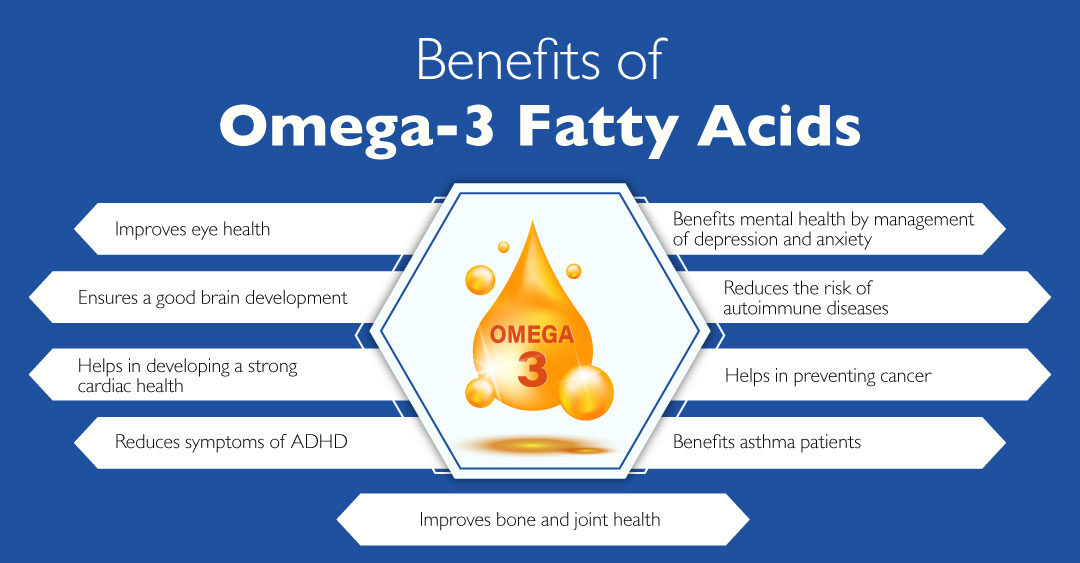Introduction
Omega-3 fatty acids are essential fats that our bodies cannot produce on their own, making it vital to obtain them from our diet. These fats are crucial for various bodily functions and have been extensively studied for their health benefits. Omega-3s come in several forms, primarily ALA (alpha-linolenic acid), EPA (eicosapentaenoic acid), and DHA (docosahexaenoic acid), each contributing to health in unique ways.
Omega-3 and Skin Health
Hydration and Moisture
One of the most significant benefits of omega-3 fatty acids is their ability to improve skin hydration. By maintaining the skin’s lipid barrier, omega-3s help to keep the skin moisturized, preventing dryness and flakiness.
Anti-Inflammatory Properties
Omega-3s are known for their anti-inflammatory properties, which can be particularly beneficial for individuals suffering from skin conditions such as eczema or psoriasis. By reducing inflammation, these fatty acids help alleviate redness and irritation.
Protection Against UV Damage
Omega-3 fatty acids can also provide some protection against harmful UV rays. They help the skin to repair itself after sun exposure, reducing the risk of sunburn and long-term skin damage.
Omega-3 and Hair Health
Promoting Hair Growth
If you’re struggling with hair thinning or hair loss, omega-3s can help. These fatty acids nourish hair follicles and promote healthy hair growth, resulting in thicker, fuller hair.
Reducing Hair Loss
By reducing inflammation in the scalp, omega-3s can minimize hair loss and support a healthy hair growth cycle.
Enhancing Shine and Texture
Regular consumption of omega-3s can improve the texture and shine of hair, making it more manageable and vibrant.
Omega-3 and Heart Health
Lowering Cholesterol Levels
Omega-3 fatty acids have been shown to lower triglyceride levels and increase HDL (good) cholesterol. This balance is vital for maintaining a healthy heart.
Reducing Blood Pressure
Incorporating omega-3s into your diet can help reduce blood pressure, a significant factor in cardiovascular health.
Preventing Heart Disease
Research indicates that omega-3s can reduce the risk of heart disease by preventing the formation of arterial plaques, keeping the heart and blood vessels healthy.
Omega-3 and Liver Health
Preventing Fatty Liver Disease
Omega-3s can play a significant role in preventing non-alcoholic fatty liver disease (NAFLD) by reducing fat accumulation in the liver.
Supporting Liver Function
These fatty acids help enhance liver function, allowing for better detoxification processes and overall health.
Anti-Inflammatory Effects
Omega-3s reduce liver inflammation, promoting a healthier liver environment and potentially reversing liver damage.
Omega-3 and Brain Health
Cognitive Function and Memory
DHA, a primary component of omega-3s, is essential for brain health. It helps improve cognitive function and memory, making it particularly important as we age.
Reducing Symptoms of Depression and Anxiety
Studies suggest that omega-3s can alleviate symptoms of depression and anxiety, contributing to improved mental health.
Protecting Against Neurodegenerative Diseases
Regular intake of omega-3 fatty acids may lower the risk of neurodegenerative diseases, such as Alzheimer’s and dementia.
Omega-3 and Eye Health
Supporting Retinal Health
DHA is a crucial component of the retina. Adequate omega-3 intake supports retinal health, helping maintain good vision.
Reducing Dry Eye Symptoms
Omega-3s can improve tear production, providing relief for individuals suffering from dry eye syndrome.
Preventing Age-Related Macular Degeneration
Research indicates that omega-3s can reduce the risk of age-related macular degeneration (AMD), a leading cause of vision loss.
Omega-3 and Kidney Health
Improving Kidney Function
Omega-3 fatty acids can enhance kidney function by promoting better blood flow and reducing inflammation.
Reducing Inflammation
Incorporating omega-3s into your diet can help manage chronic inflammation, which is vital for maintaining healthy kidneys.
Supporting Chronic Kidney Disease Management
For those with chronic kidney disease, omega-3s may help slow disease progression and improve overall kidney health.
Omega-3 and Sperm Quality
Enhancing Sperm Count
Emerging research suggests that omega-3 fatty acids can enhance sperm count, making them an essential component of male fertility.
Improving Sperm Motility
Omega-3s are also linked to improved sperm motility, meaning healthier and more active sperm that are better able to reach and fertilize an egg.
Overall Impact on Male Fertility
By improving both sperm count and motility, omega-3 fatty acids can have a significant positive impact on overall male fertility.
Conclusion
In conclusion, omega-3 fatty acids are powerful allies in promoting and maintaining health across various body systems. From enhancing skin and hair health to supporting heart, liver, brain, eye, kidney health, and even improving sperm quality, the benefits of omega-3s are extensive and well-documented. Including sources of omega-3s in your diet, such as fatty fish, flaxseeds, and walnuts, can be an excellent way to harness these health benefits.
FAQs
- What are the best sources of omega-3?
- The best sources include fatty fish (like salmon and mackerel), flaxseeds, chia seeds, walnuts, and algae supplements.
- How much omega-3 should I consume daily?
- Generally, it’s recommended to aim for about 250-500 mg of combined EPA and DHA daily.
- Are omega-3 supplements safe to take?
- Most people can safely take omega-3 supplements, but consult a healthcare provider, especially if you have existing health conditions.
- Can omega-3 help with skin conditions?
- Yes, omega-3 fatty acids can help reduce inflammation and alleviate skin conditions like eczema and psoriasis.
- Is it better to get omega-3 from food or supplements?
- While supplements can be beneficial, it’s generally best to get omega-3s from food sources for additional nutrients and benefits.https://knowledgemount.com/

You could certainly see your enthusiasm in the paintings you write. The arena hopes for even more passionate writers like you who are not afraid to mention how they believe. All the time go after your heart.